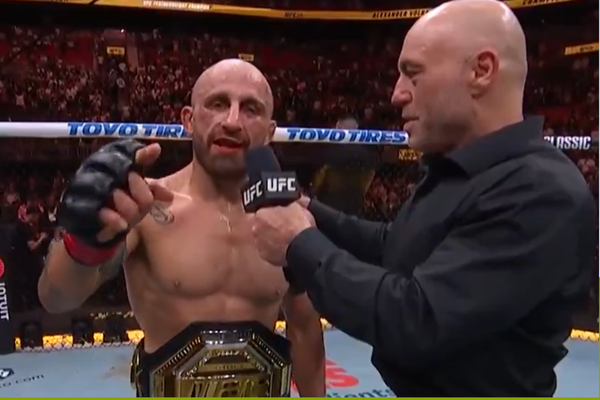
via Imago
X

via Imago
X
Alexander Volkanovski let the world in on one of the most raw and emotional moments of his career, standing in front of Joe Rogan after a hard-fought victory at UFC 314 against Diego Lopes. He wasn’t simply speaking as a fighter who had recently reclaimed the featherweight gold; he was speaking as a man who had been through hell and emerged stronger. “It’s good to be back for everyone watching,” Volkanovski added, struggling to contain his emotions. “Hey, adversity is a privilege. You hear people talk about that all the time. It truly is. This moment is incredible.” To many, it would seem like a normal part of a victory speech. However, those statements held more weight than most of the audience understood.
Back in 2023, ‘The Great’ had to deal with demons far more personal than those he faced within the cage. Following two painful losses to Islam Makhachev, including a nasty knockout in their rematch at UFC 294, the Australian featherweight legend found himself in a downward spiral. He revealed in an interview last year that he drank every day throughout that time, using alcohol to deal with emotional stress and uncertainty. “I just wasn’t happy where I was,” he admitted in a candid interview on FREESTYLEBENDER‘s YouTube channel. “The drinking was helping… it was just that time.”
Alexander Volkanovski was not looking for sympathy. If anything, he was attempting to prove that even the strongest of us can fall into dark places—and that it’s okay to admit it. “I’m someone who’s very self-aware… everyone gets vulnerable. Everybody has their moments. I’m okay that people saw me like that.” His choice to take the Makhachev rematch on only 12 days’ notice, while still dealing with internal upheaval, resulted in one of his toughest losses. However, in retrospect, Volkanovski believes that defeat was a blessing in disguise. It forced him to face what he had been running from.
ADVERTISEMENT
Article continues below this ad
“Adversity is a privilege.” 👏@AlexVolkanovski knows how much he wanted to feel this moment again!
[ #UFC314 ] pic.twitter.com/z9R5i1vIs4
— UFC (@ufc) April 13, 2025
Alexander Volkanovski proved his continued elite status in UFC 314. He took damage, dealt more, and won a unanimous decision against Diego Lopes in a tough, back-and-forth fight. More importantly, he reminded the world that champions are judged not just by their titles, but also by how they handle failure. Now it would be interesting to see who his next opponent will be and how ‘The Great’ manages to fight both his inner demons and the next rival to keep the featherweight gold to himself. But after getting into a dark mental space like that, how did he bounce back?
ADVERTISEMENT
Article continues below this ad
Alexander Volkanovski reveals Islam Makhachev’s key role
Coming out of UFC 314 with his hand raised, Alexander Volkanovski appeared to have won far more than a belt. However, in order to fully understand his recovery, you must first consider the storm he faced following UFC 290. It wasn’t simply the physical toll or the defeats; it was the void that followed. Volkanovski confessed that his acceptance of the rematch against Islam Makhachev was motivated by desperation rather than confidence. He needed something—anything—to bring himself back to life. “I thought, ‘Let’s do it; I need to snap out of this rut. This is exciting, a challenge, and exactly what I need right now,” he recalled.
In hindsight, that loss may have saved him. Makhachev’s vicious head kick at UFC 294 was more than simply a setback; it was a mirror. It pushed ‘The Great’ to confront who he had become: a drifter who used booze to mask his sorrow and fought without truly being present. Nonetheless, rather than denying or making excuses, he accepted responsibility.
ADVERTISEMENT
Article continues below this ad
What’s your perspective on:
Does Volkanovski's journey prove that true champions are forged in the fires of personal struggle?
Have an interesting take?
“All credit to him. He set up that kick perfectly,” he said. “I was just disappointed with the person I had become leading up to that fight.” That kind of reflection doesn’t come easy, especially for fighters who have been trained to push through pain and conceal emotions. Alexander Volkanovski, on the other hand, did not avoid it; rather, he made use of it.
In combat sports, it is unusual for a loss to serve as the foundation for a comeback. But that is precisely what happened here. Unintentionally, Makhachev became the catalyst that enabled Volkanovski achieve clarity. It’s almost poetic—the individual who brought him to his lowest moment may have also given him the motivation to rediscover who he actually is. ‘The Great,’ who is once again at the top of the division, does not only appear to be a fighter who has won a title. He appears to have earned his way back. What do you think? Will he be able to hold the title for longer this time? Let us know in the comments.
ADVERTISEMENT
ADVERTISEMENT
ADVERTISEMENT
ADVERTISEMENT


Does Volkanovski's journey prove that true champions are forged in the fires of personal struggle?